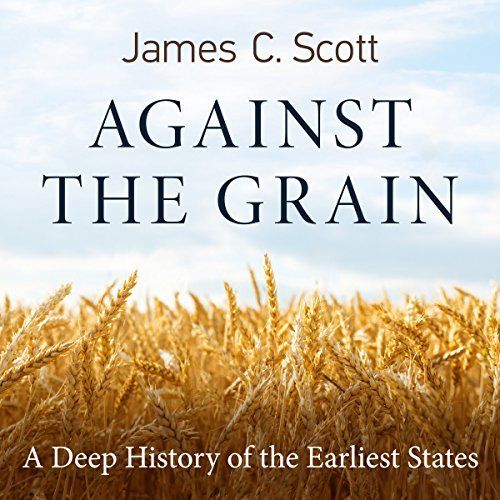You are here
Against the Grain: A Deep History of the Earliest States (2017)
Primary tabs
| Size | Seeds | Peers | Completed |
|---|---|---|---|
| 236.14 MiB | 2 | 0 | 69 |

An account of all the new and surprising evidence now available for the beginnings of the earliest civilizations that contradict the standard narrative
Why did humans abandon hunting and gathering for sedentary communities dependent on livestock and cereal grains, and governed by precursors of today’s states? Most people believe that plant and animal domestication allowed humans, finally, to settle down and form agricultural villages, towns, and states, which made possible civilization, law, public order, and a presumably secure way of living. But archaeological and historical evidence challenges this narrative. The first agrarian states, says James C. Scott, were born of accumulations of domestications: first fire, then plants, livestock, subjects of the state, captives, and finally women in the patriarchal family—all of which can be viewed as a way of gaining control over reproduction.
Scott explores why we avoided sedentism and plow agriculture, the advantages of mobile subsistence, the unforeseeable disease epidemics arising from crowding plants, animals, and grain, and why all early states are based on millets and cereal grains and unfree labor. He also discusses the “barbarians” who long evaded state control, as a way of understanding continuing tension between states and nonsubject peoples.
An Economist Best History Book 2017
Reviews
Fascinating.
—George Monbiot, Guardian
The most interesting non-fiction read of the year. . . . Urgently recommended, and fun to read as well.
—Tyler Cowen, Marginal Revolution
Fascinating. . . . Our agrarian-biased view of history, Scott concludes, could use some reworking. Most of the world’s early human populations likely enjoyed semisettled, semiagrarian lives beyond the state’s grasp.
—Suzanne Shablovsky, Science
Fascinating. . . . Thinkers like Scott remind us that who we thought we are might not necessarily be the case. Such knowledge is empowering.
—Derek Beres, Big Think
[Against the Grain] presents a comprehensive and convincing case that the transition from hunter-gatherer nomadism to permanent, agriculturally dependent settlements was a complete disaster for humankind. . . . Whatever your political leanings, the implications of Scott’s book are as fascinating as they are wide-ranging.
—Will Collins, The American Conservative
James C. Scott [is] an eminent and iconoclastic political scientist. . . . In his rich and varied career, Scott has found many ways to second-guess structures that prop up the powerful. . . . Although Against the Grain is not a large book, it is a kind of thematic summa of Scott’s work so far, as it reworks the entire canvas of history by reconsidering its origins through the lens of state-formation.
—Jedediah Purdy, The New Republic
One of those rare books that really changes your worldview — or somehow crystallizes where your mind has been trending.
—Andrew Sullivan, Daily Intelligencer, New York Magazine
For more than 40 years, James Scott has written about those who resist being incorporated into political-economic systems. . . . In a provocative new book, Against the Grain, Scott now challenges us to rethink legends about the state and its origins.
—Jacob Levy, Reason
A sweeping and provocative look at the 'rise of civilization,' focusing particularly on those parts, peoples, and issues that are normally overlooked in conventional historical narratives.
—Alison Betts, The University of Sydney
This book is fascinating and original, containing a lesson on every page. Brilliant. James Scott is a legend.
—Tim Harford, author of Messy and The Undercover Economist
Scott is at his most intellectually omnivorous in Against the Grain, drawing on a vast array of sources to upend our basic assumptions about state formation and civilization.
—Edward D. Melillo, author of Strangers on Familiar Soil: Rediscovering the Chile-California Connection
Against the Grain is not just a “counternarrative,” an outsider’s skeptical reaction to received wisdom about the evolution of agricultural systems and the first states in Mesopotamia. Vainglorious kings with their generals and armies, sycophantic scribes, and royal architects and engineers are not Scott’s heroes. His concerns are with urban laborers, peasants, and barbarians and the cleavage planes of resistance to rulers. Those studying Mesopotamia—and other early states—take heed.
—Norman Yoffee, editor of Early Cities in Comparative Perspective
A contemporary master of the political counter-narrative has produced a book on the origins of civilization – this is, quite simply, a must-read.
—David Wengrow, author of What Makes Civilization?
About the Author: James C. Scott is Sterling Professor of Political Science and codirector of the Agrarian Studies Program at Yale University.
| File | Duration |
|---|---|
| AgainstTheGrain.2017.1.mp3 | 17m7s |
| AgainstTheGrain.2017.2.mp3 | 1h1m |
| AgainstTheGrain.2017.3.mp3 | 58m25s |
| AgainstTheGrain.2017.4.mp3 | 52m27s |
| AgainstTheGrain.2017.5.mp3 | 47m37s |
| AgainstTheGrain.2017.6.mp3 | 1h8m |
| AgainstTheGrain.2017.7.mp3 | 1h4m |
| AgainstTheGrain.2017.8.mp3 | 1h11m |
| AgainstTheGrain.2017.9.mp3 | 1h14m |
| Total Duration | 8h33m36s |
- Log in to post comments
